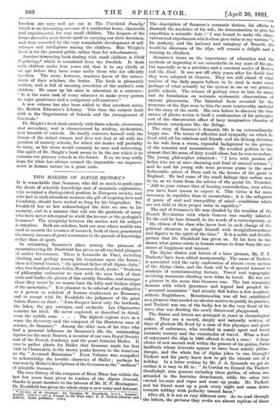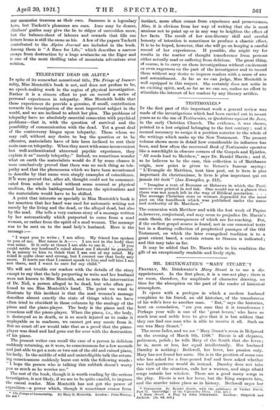TWO MAKERS OF ALPINE HISTORY.*
IT is remarkable that Saussure, who did so much to push open the doors of scientific knowledge and of mountain exploration, who occupied a distinguished position in European society, and who had in such abundant measure the gift of inspiring love and friendship, should have waited so long for his biographer. Dr. Freshfield has at last acknowledged the debt we owe to his memory, and in a manner that will win the gratitude of many who have never attempted to wield the ice-axe or the geologist's hammer.' The sympathy between the author and his subject is complete. Both are scholars, both are men whose wealth was used to smooth the avenues of research, both of them penetrated the snowy recesses of great mountains in the pursuit of knowledge rather than of sport.
In estimating Saussure's place among the pioneers of mountaineering Dr. Freshfield has given us all-too-brief glimpses of earlier forerunners. There is Leonardo da Vinci, including climbing and geology among his trespasses upon the future ; there is Conrad Leaner, " the spiritual father of all Alpine clubs," who, two hundred years before Rousseau lived, wrote : " Students of philosophy endeavour to view with the eyes both of their souls and bodies the glories of this earthly Paradise, and amongst these they count by no means least the lofty and broken ridges of the mountains." It is pleasant to be relieved of an obligation to a person so redolent of human weaknesses as Rousseau, and to accept with Dr. Freshfield the judgment of the great Sainte-Beuve as final : " Jean Jacques knew only the lowlands, the lakes, the gay cottages, and orchards. Les Charmettes remains his ideal. He never explored, or described in detail, even the middle zone. . . . The highest regions were in a sense the discovery and the conquest of the illustrious man of science, de Saussure." Among the older men of his time who had a personal influence on Saussure's life the outstanding figures are his uncle Bouvet, a member of our own Royal Society and of the French Academy, and the great botanist Haller. It was to gather plants for Haller that Saussure made his first visit to Chamo unix, to the snowy peaks known to the Genevese as the " Accursed Mountains." Even Voltaire was compelled to acknowledge the lovable character of Haller ; perhaps he was won by Haller's descriptions of the Germans as the "cashiers" of scientific treasure.
The true history of the conquest of Mont Blanc has within the last few years been given to readers of the Alpine Journal, thanks in great measure to the labours of Mr. H. F. Montagnier. Dr. Freshfield has given the whole story a new unity and interest.
• (1) Life of de (Saussure. By Douglas W. Freshfleld. D.C.L. London :
Arnold. 1258.] 2) 4 Pioneer in the High Alps: P. F. Tuekett (Diaries and Letters). Same publisher. (215.1
The description of Saussure's romantic desires, his efforts to diminish the anxieties of his wife, his determination to give his expedition a scientific halo (" I was bound to make the obser- vations and experiments which alone gave value to my venture "), his modesty, and the jealousy and vainglory of Bourrit, the would-be showman of the Alps, will remain a delight and a warning to climbers.
Sausaure's views on the importance of education and the methods of imparting it are remarkable in any man of his age, but especially so in a patrician and a constant reader of Horace and the Iliad. It was not till sixty years after his death that they, were adopted at Geneva. They are still ahead of what readers of the daily papers believe to be (and in some cases perhaps of what actually is) the system in use at our greatest public schools. The science of geology owes to him its name and its foundation on accurate systematic observations of natural phenomena. The historical facts revealed by the structure of the Alps were to him the most trustworthy material for the story of the earth. His own failure to discover the true nature of glacier action is itself a confirmation of his principles and of the obscurantist effect of hazy imaginative theories of prehistoric cataclysms like the Deluge.
The story of Saussure's domestic life is an extraordinarily happy one. The terms of affection and sympathy on which he lived with all his relations and friends and his lifelong devotion to his wife form a warm, reposeful background to the picture of the scientist and mountaineer. He avoided politics to the utmost that his sense of duty would allow, but he was no recluse. The young philosopher admitted : " I love with passion all ladies who are at once charming and fond of natural science " ; and he and his young wife were personae gratae in the most fashionable salons of Paris and in the houses of the great in England. He had some of the small failings that endear men to us, as we learn from the advice of the genial Dr. Tronchet. " Add to your virtues that of bearing contradiction, even where you have least reason to expect it. This virtue is far more necessary in republics than in monarchies ; it is the safeguard of peace of soul and tranquillity of mind—conditions which are not held at their proper value in republics."
The end of Saussure's life was clouded by the troubles of the French Revolution with which Geneva was readily infected. To the end he bore himself, in the words of a contemporary, as " the citizen of his class who knew best in each change of the political situation to adapt himself with straightforwardness and dignity to the spirit of the time." It is a noble and lovable picture that Dr. Freshfield has given us. In his hero ho has shown what power exists in human nature to draw from life new stores of happiness and interest.
The Alpine diaries and letters of a later pioneer, Mr. F. F. Tuckett,2 have been edited anonymously. The name of Tuckett is associated with the early exploration of almost every section of the Alpine chain, and the book will be of special interest to students of mountaineering history. Travel and topography involving strenuous climbing were what he loved. He was not a pioneer in the sense that Saussure was. The last remaining demons with which ignorance and legend had peopled the " accursed mountains " had already fled before a few sceptical, athletic Englishmen. Mountaineering was all but established as a pleasure that needed no ulterior motive to justify its practice, and Tuckett was one of the lucky few in the very front of the wave that was flooding the newly discovered playground.
The diaries and letters are arranged in years in chronological order. They are a record, simply and naturally written, of days of glorious life lived by a man of fine physique and great powers of endurance, who revelled in manly sport and loved romantic scenery and the vicissitudes of travel. What a feast of enjoyment the Alps in 1860 offered to such a man ! A large choice of new ascents well within the powers of his guides, Swiss landlords whose interests appear to have been mainly philan- thropic, and the whole list of Alpine jokes to run through ! Tuckett and his party knew how to get the utmost out of a holiday. In a letter written by Mr. J. A. Symonds we get an outline it is easy to fill in : " At Cortina we formed the Tuckett Glesellsdiaft, nine persons including three guides, of whom one attended to the feminine detachment, while the other two carried ice-axes and ropes and went up peaks. Mr. Tuckett and his friend went up a peak every night and came down towards midday with perfectly tanned faces."
After all, it is not so very different now. As we read through the letters, the pictures they evoke are almost replicas of those
our memories treasure as their own. Saussure is a legendary hero, but Tuckett's pleasures are ours. Inns may be dearer, climbers' guides may give the lie to ridges of untrodden snow, but the balance-sheet of labours and rewards that fills our letters home is still the same as his. A few of the papers Tuckett contributed to the Alpine Journal are included in the book. Among them is " A Race for Life," which describes a narrow escape from destruction by a huge avalanche on the Eiger and is one of the most thrilling tales of mountain adventure ever written.



































 Previous page
Previous page